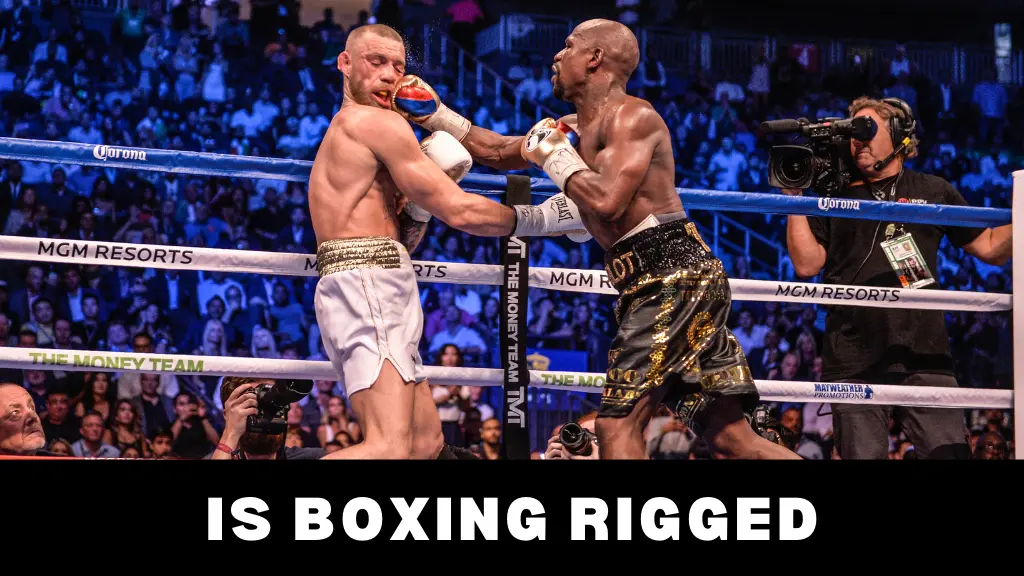Is Boxing Rigged
Boxing, often scrutinized for controversial decisions and the influence of financial interests, operates within a nuanced landscape that can lead to perceptions of unfairness. Despite this, the sport is regulated by bodies dedicated to maintaining its integrity, making outright rigging rare. The majority within the boxing community strives to uphold its credibility, balancing commercial appeal with competitive integrity.
High-Profile Controversies
High-profile controversies have indeed cast shadows over the boxing world at various times, stirring debates on the sport’s integrity.
- Questionable Judging Decisions: Many controversies arise from decisions where the judges’ scores do not seem to align with the observed performance of the boxers, leading to widespread debate and dissatisfaction among fans, fighters, and analysts.
- Unexpected Outcomes: Fights that conclude in a manner contrary to widespread expectations, such as underdog victories or surprising knockouts, can sometimes raise questions about the legitimacy of the match’s conclusion.
- Allegations of Corruption: Accusations of fights being swayed by finances or ties between promoters and governing bodies fuel rigging suspicions.
- Disputed Decisions: High-profile fights ending with controversial split or unanimous decisions that divide the boxing community and ignite debates over scoring criteria and judge competency.
- Influence of Financial Interests: The significant monetary stakes involved in major bouts can lead to speculation that financial interests might sway match outcomes, affecting matchmaking, judging, and the enforcement of rules.
The Role of Money
The role of money in boxing is both undeniable and profound, influencing various aspects of the sport from matchmaking to the careers of fighters. Here’s how financial stakes impact boxing:
- Matchmaking and Fighter Exposure: Financial considerations can influence which fights are made, with promoters and networks prioritizing bouts that promise significant revenue through pay-per-view sales, ticket sales, and sponsorships. This can sometimes lead to mismatches or delay deserving fighters from getting their title shot due to the perceived lack of marketability.
- Promotional Power: Promoters wield considerable influence in the boxing world, and their financial interests can impact the trajectory of fighters’ careers. Fighters signed with powerful promoters often get better opportunities, more exposure, and favorable matchmaking, raising questions about fairness and meritocracy.
- Judging and Decision Making: While not directly implicating judges in corruption, the financial implications of a fight’s outcome can lead to speculations about biased judging. High-stakes fights, especially those involving popular fighters or potential rematches, can be clouded by controversial decisions that some believe are influenced by the potential financial windfall a particular outcome could generate.
- Boxer’s Pay and Contracts: The vast disparity in pay between top-tier and lower-tier fighters reflects the financial dynamics at play. Star boxers earn multimillion-dollar purses, while lesser-known fighters get much less, pushing them to seek specific matchups or take risks.
- Economic Impact on the Sport’s Integrity: The overarching influence of money can make fans and observers cynical, questioning if financial interests can compromise the sport’s integrity. This scepticism can affect the sport’s reputation, potentially deterring new fans or disheartening long-time followers.
How Boxing Matches Are Judged
- The 10-Point Must System: The most widely used scoring system in boxing is the 10-point must system. Each round gives the winner 10 points and the loser 9 or fewer, based on knockdowns and dominance. Even rounds can yield 10 points for both, though rare.
- Criteria for Scoring: Judges score rounds on criteria: effective aggression, defense, ring generalship, and hard, clean punches.
- Subjectivity and Perception: Despite the criteria, scoring remains subjective. Different judges may prioritize certain aspects over others, leading to varied interpretations of who won a round. This subjectivity is a significant factor in why decisions can be contentious.
- Controversial Decisions: Controversial decisions often stem from tight matches, challenging judges to identify clear round winners. Disputed decisions can lead to calls for rematches or criticisms of the judging system.
- Role of Judges: Judges are positioned around the ring to give different perspectives on the fight. Their crucial role, despite training, invites debate over decision transparency and the need for extra training or tech aids.




